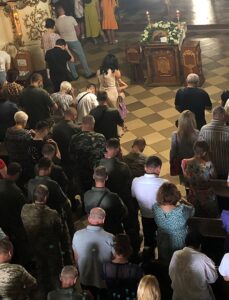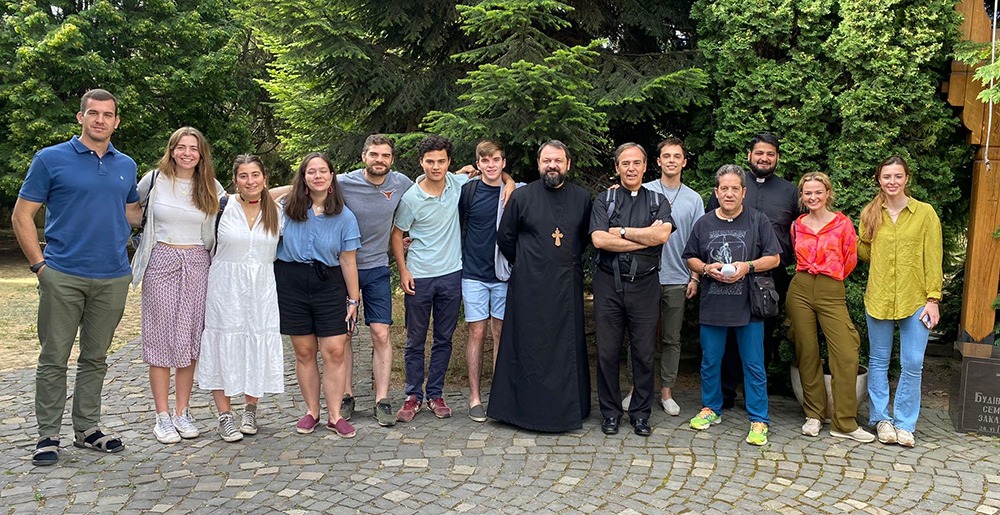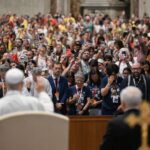 Interecclesias is an initiative of Youth Missionary, which arose from the experiences lived during the World Youth Day in Poland 2016. In these, young people experience a unique ecclesial experience by living with families and young people from other countries and nations: faith, culture, folklore, apostolates… The destination of this year was Ukraine.
Interecclesias is an initiative of Youth Missionary, which arose from the experiences lived during the World Youth Day in Poland 2016. In these, young people experience a unique ecclesial experience by living with families and young people from other countries and nations: faith, culture, folklore, apostolates… The destination of this year was Ukraine.
At the forefront of Interecclesias, once again, was Father Arturo Díaz, LC, who is also the chaplain of the Carmelite Monastery of the Incarnation, in Ávila. He, along with eleven young people from Ávila, Madrid, Barcelona, Bilbao, Pamplona, and Salamanca, set out for the Catholic parish of Uzhgorod, Ukraine, to deliver in three vans, a large cargo van, not only material aid but also affection and presence: “The people in Ukraine live in the tension of a conflict, where at any moment a bomb can arrive and Russian tanks may appear,” explains Father Arturo, aware of the risks that such an apostolate can entail.
How did the idea of going to Ukraine originate?
At the Monastery of the Incarnation in Ávila, there is a Carmelite sister whose sister has been living in Kiev for 12 years in the program called “Families on Mission” by the Neocatechumenal Way. With the outbreak of the war, they had a family meeting, as they are a family of 12 children and the parents, and decided to stay. They considered that if they had come to Ukraine to serve and help, now was the time, and they could not leave the people and the community. A very heroic and meritorious decision.
We have always maintained contact with them and sent aid. Like other families, they were relocated to the Carpathian region, in the city of Uzhgorod. We agreed that in summer we would not only send help but also go, as has been done.
What have you contributed?
The family in Ukraine provided us with a list of needs. These were made by parishes, seminaries, and communities. The lists went beyond the usual items many think of, as they requested liturgical items that also run out and are scarce during wartime: wine for Mass, hosts, charcoal for incense, candles, purifiers… In this liturgical realm, we also brought vestments, chalices, ciboria, cruets, ciboriums… Even a large paella pan for 40 people, as the Ukrainian cook from a retreat house had learned to make paellas, and during wartime, it is a meal that can feed many.
In addition to all these lists, which included pharmaceutical items, hygiene, cleaning, clothing… one of the things we most perceived and were told was the appreciation of our presence, even more than the items we brought.
What other activities have you participated in?
We attended a refugee gym, as many from conflict zones have arrived in these regions. We visited and helped the priest director of Caritas. We participated in the life of some parishes. We shared time with the director of vocational pastoral and the young people working with him. All of them filled us with their initiatives and needs.
How do people live in this part of Ukraine?
People in Ukraine live in the tension of a conflict, where at any moment a bomb can arrive and Russian tanks may appear. This is evident in their faces. Moreover, almost all families have someone on the front lines, which creates a constant concern about the news that may arrive. The city where we stayed was full of billboards encouraging Ukrainian troops, giving thanks to God for the resistance and daily life.
What is the faith of these Catholics like, being they are a minority in the country?
Ukraine is a very religious nation. We saw churches full on Sundays. We could say that about 60% are Orthodox and 40% are Catholic. Most Catholics are of Byzantine rite, so their celebrations are very rich in singing, incense, blessings, icons, and last longer than ours.











